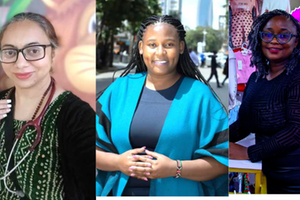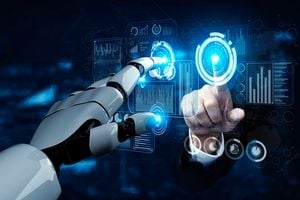
Local experts are calling for tech firms to build child safeguards before products launch as AI threats grow.
Eric Schmidt, 69, is the definition of the American tech billionaire and Silicon Valley insider. A computer engineer, he has been CEO and executive chairman at Google, among other roles, including for the parent company, Alphabet.
He has done a stint at all the biggies: Bell Labs, Sun Microsystems and became the CEO of Novell 30 years ago, before many of you were born, and is worth more than $30 billion.
In 2018, he was appointed chairman of the National Security Commission on Artificial Intelligence. When he speaks about digital technology, he speaks with authority.
In a recent interview, he made an important revelation: in six years, humanity will have completely separated intelligence from us and invested it in beings over which we have no control. So, lets lay the foundation by revisiting that interview.
First, he says that over the next one year, the “vast majority” of computer programmers will be replaced by AI programmers. Secondly, he says that in leading research institutions such as OpenAI and Anthropic, between 10 and 20 per cent of the code in their research programmes is being done by the computer.
When this becomes a widespread practice, then we will have “recursive self-improvement”, defined by Mr Google as “the process where an AI system improves its own capabilities, including its ability to self-improve, leading to potentially exponential growth in intelligence”.
So, in three to five years, researchers will achieve AGI (artificial general intelligence), that is to say, they will build a computer system that is cleverer than the cleverest human in any field: writing, painting, coding, design etc. And it will be improving itself in ever faster rates.
Finally, in six years, an intelligence will be born that is smarter than the sum of human beings, that is all of us put together, that will be entirely free of its creators, capable of thinking and planning for itself, and that will be self-improving at rates we couldn’t fathom—artificial superintelligence (ASI).
The San Francisco Consensus, as Mr Schmidt terms it, is in essence that by 2031, humanity will have succeeded in decoupling from intelligence.
The process has already started and there is nothing much we can do about it; we will create a free, independent, vastly superior intelligence outside of our control. The big question is: what does this mean?
Mr Schmidt says ASI is not being discussed that much because “there is no language for it”, in other words, few people understand it and what it could mean for our species. But even more important, what does it mean for disorganised societies such as ours where achievement is defined as 100 acres of grabbed land and being “industrious” is packing bags full of stolen cash?
What does it mean for our survival, for public policy, for the objectives of our education system? Do we continue to educate our children how to scratch roast bananas in 2031?
For me, it is quite obvious. If we could retain some control of superintelligent systems, then we can use them to solve many of our pressing problems.
First, we need to design a global political system that is not based on violence and personal greed, but which defines our purpose as solving humanity’s problems—disease, short life-spans and achingly slow evolution. We need to use science to eradicate disease and increase the average life to about 1,000 years.
And instead of killing each other in defence of little bantustans, humans should go into the universe and find new planetary systems to colonise and spread life beyond this galaxy. In peace, we should go out into the heavens and pay God a visit.
Secondly, we need to have a discussion about what it means to be human. We are fragile, we cannot withstand the radiation and vacuum of outer space. We need very special conditions to live—we must eat, sleep and exist within a small temperature band, and it takes thousands of years to improve ourselves naturally.
The question is: would we still be human if we were not conceived in sex, gestated in a womb or if we get brain implants and exoskeletons? Or would we rather become extinct?
At a national and continental level, if there was an extinction-level threat, whether from space, geophysical or even biological sources, probably the only African who has a chance of survival is Elon Musk and his many children.
What AI is doing is giving backward societies, those that can summon the discipline and be organised, a transformational moment to be able to change dramatically in just a generation. But they must make the right calls, invest wisely and consistently and build the right systems. Kenya has a five-year AI strategy with a budget of Sh152 billion and I suppose we are therefore fine.
Tech billionaires are big on focus, sometimes defined as knowing which important things not to do.
Happy Easter my friends. May the peace and bounty of Our Lord find you and your families.
mmutuma@Steward-Africa.com.








